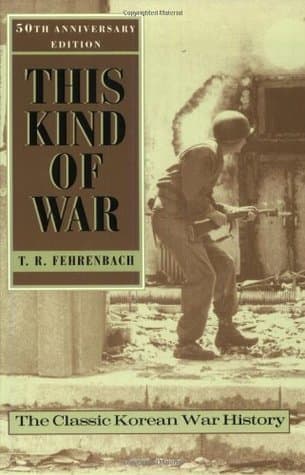
Book Review Summary: This Kind of War: A Study in Unpreparedness
Introduction
This Kind of War: A Study in Unpreparedness is a book that delves into the military aspects of the Korean War (1950-1953). Written by T.R. Fehrenbach, a former U.S. Army officer and historian, the book offers a comprehensive account of the conflict from a personal perspective. Fehrenbach provides a unique blend of social commentary and military analysis, exploring the tensions between the civilian world's values and the more Spartan, totalitarian world of the military.
About T.R. Fehrenbach
T.R. Fehrenbach, the author of This Kind of War, was an American historian, columnist, and former head of the Texas Historical Commission. Born in 1926, Fehrenbach graduated from Princeton University in 1947 and served as an officer in the U.S. Army during the Korean War. His experiences shaped his perspective on the conflict, which he explores in this book. Fehrenbach was known for his expertise on Texas, Mexico, and the Comanche people, and he wrote extensively on these subjects throughout his career.
Analysis of Views
- Personal Narratives: One of the standout aspects of This Kind of War is the inclusion of personal narratives from small-unit commanders and their troops. Fehrenbach draws from official records, operations journals, and histories to provide a "you were there" account of American troops in combat against North Korean and Chinese communist invaders. This approach adds depth and authenticity to the story, allowing readers to gain a firsthand understanding of the experiences of those who fought in the Korean War.
- Social Commentary: Fehrenbach addresses the conflict between the social liberalism valued by civilians and the more Spartan, totalitarian world of the military. He argues that war is not a game and that it requires a different mindset and level of commitment from soldiers. This social commentary adds a layer of complexity to the book, exploring not only the military aspects but also the broader societal implications of war.
- Military Focus: While some readers appreciate Fehrenbach's focus on military details and tactics, others find it daunting or dry. The book covers a wide range of topics, from strategic and operational aspects to individual battles and personal accounts. Readers who are familiar with military terminology may find it easier to follow, while those less familiar with military jargon may struggle to fully grasp some aspects of the book.
- Lack of Visual Aids: Some readers note that the book lacks visual aids such as battle maps or diagrams, which could enhance the understanding of certain events and battles. While Fehrenbach provides a detailed narrative, the absence of visual aids may make it more challenging for readers to grasp certain aspects of the conflict.
- Political Analysis: Fehrenbach offers political analysis throughout the book, critiquing decisions made by political leaders and examining their impact on military strategy. Readers appreciate his insights into the political landscape of the time, but some find his political commentary to be biased or one-sided.
Reasons for Recommendation
- Comprehensive Coverage: This Kind of War provides a comprehensive overview of the Korean War, covering both tactical and strategic aspects of the conflict. Readers appreciate Fehrenbach's ability to seamlessly transition between macro and micro levels, offering a well-rounded understanding of the war.
- Personal Narratives: The inclusion of personal narratives from soldiers adds depth and authenticity to the book, allowing readers to gain a firsthand understanding of the experiences faced by those who fought in the Korean War. This unique approach sets This Kind of War apart from other military history books.
- Social Commentary: Fehrenbach's exploration of social commentary adds a layer of complexity to the book, delving into broader societal implications beyond just military strategy. Readers appreciate this aspect as it provides a deeper understanding of war's impact on society as a whole.
Reasons for Not Recommendation
- Political Bias: Some readers find Fehrenbach's political analysis to be biased or one-sided, particularly in his criticism of General MacArthur's decisions during the war. This bias may detract from the overall objectivity of the book and limit its appeal to readers seeking a more balanced perspective.
- Density and Dryness: While some readers appreciate Fehrenbach's attention to detail and tactical analysis, others find the book dense and dry at times. The lack of visual aids and Fehrenbach's use of military jargon may make it challenging for some readers to fully engage with certain sections of the book.
Conclusion
This Kind of War: A Study in Unpreparedness by T.R. Fehrenbach offers a comprehensive account of the Korean War from a personal perspective, blending social commentary with military analysis. The inclusion of personal narratives from soldiers adds depth and authenticity to the book, while Fehrenbach's exploration of social commentary provides a deeper understanding of war's impact on society as a whole. However, some readers may find the book dense and dry at times due to its focus on military details and lack of visual aids. Overall, This Kind of War is recommended for those interested in a well-rounded understanding of the Korean War and its broader societal implications.